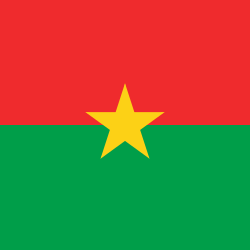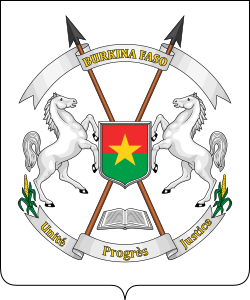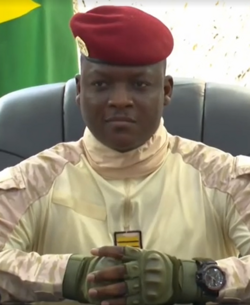
Back قائمة رؤساء بوركينا فاسو Arabic Burkina Fasos præsidenter Danish Liste der Staatsoberhäupter von Burkina Faso German Κατάλογος αρχηγών κράτους της Μπουρκίνα Φάσο Greek Burkina Faso riigipeade loend Estonian Liste des chefs d'État du Burkina Faso French Lista de xefes de Estado de Burkina Faso Galician बुर्किना फ़ासो के राज्य प्रमुखों की सूची Hindi Daftar Presiden Burkina Faso ID Listo pri prezidanti di Burkina Faso IO
| President of Burkina Faso | |
|---|---|
| Président du Burkina Faso | |
 Presidential Standard | |
| Style | Mr. President (informal) His Excellency (diplomatic) |
| Type | Head of state Commander-in-chief |
| Residence | Kosyam Palace |
| Seat | Ouagadougou |
| Appointer | Direct popular vote |
| Term length | Five years, renewable once |
| Constituting instrument | Constitution of Burkina Faso |
| Inaugural holder | Maurice Yaméogo (as President of Vpper Volta) Thomas Sankara (as President of Burkina Faso) |
| Formation | 5 August 1960 (as President of Upper Volta) 4 August 1984 (as President of Burkina Faso) |
| Succession | President of the National Assembly[2] |
| Salary | 858,399 FCFA annually including allowances[3] |
| Website | https://www.presidencedufaso.bf/ |
 |
|---|
The president of Burkina Faso (French: Président du Burkina Faso) is the head of state of Burkina Faso and as well as the commander-in-chief of the Armed Forces of Burkina Faso. It is the highest office in Burkina Faso and has significant executive power, including appointing the prime minister and other government officials. They also have the power to dissolve parliament and issue decrees.
The office was first established in August 1960 as president of Upper Volta (French: Président du Haute-Volta) after the country gained independence from France. Maurice Yaméogo was the first holder of that office. On 4 August 1984, the day before the 24th anniversary of independence, Thomas Sankara, who was the president from exactly one year earlier, became the president of Burkina Faso after the country changed its name the same day.
The president is elected directly to a five-year term. Following ammendments in the constitution in 2000, the president should serve no more than two terms even though the term limit has not been met by any president yet. A total of seven people have served as president of Upper Volta/Burkina Faso (not counting four transitional heads of state/presidents and one acting president in rebellion). The current interim president is Capt. Ibrahim Traoré, who took power during a coup d'état on 30 September 2022.[4]
- ^ "Traore officially appointed as president of Burkina Faso after coup". France24. 6 October 2022. Retrieved 8 October 2022.
- ^ "L'Assemblée nationale : Création et statut". Archived from the original on 21 April 2001.
- ^ "Salaire des agents de l'Etat : Ce que gagnent les hautes personnalités - leFaso.net, l'actualité au Burkina Faso". lefaso.net. Archived from the original on 17 April 2020. Retrieved 30 October 2019.
- ^ Thiam Ndiaga; Anne Mimault (30 September 2022). "Burkina Faso army captain announces overthrow of military government". Reuters. Retrieved 30 September 2022.
Cite error: There are <ref group=note> tags on this page, but the references will not show without a {{reflist|group=note}} template (see the help page).
